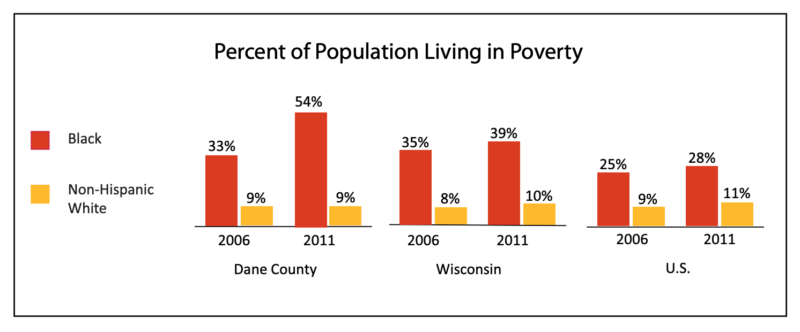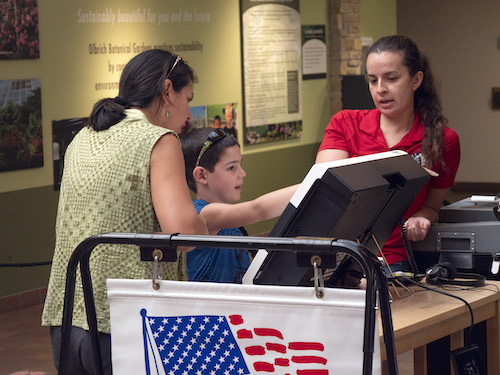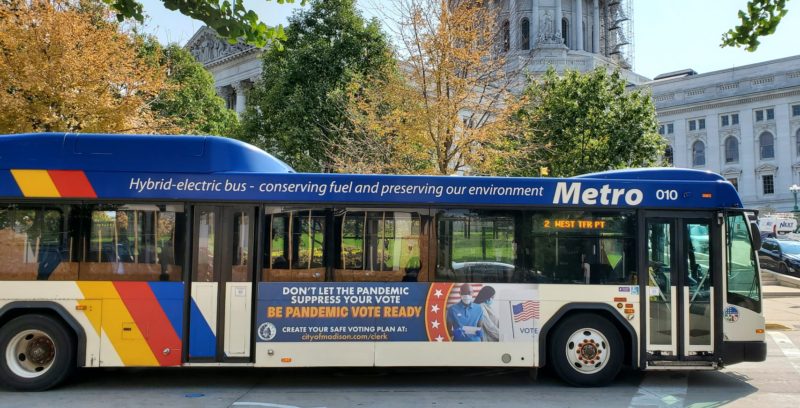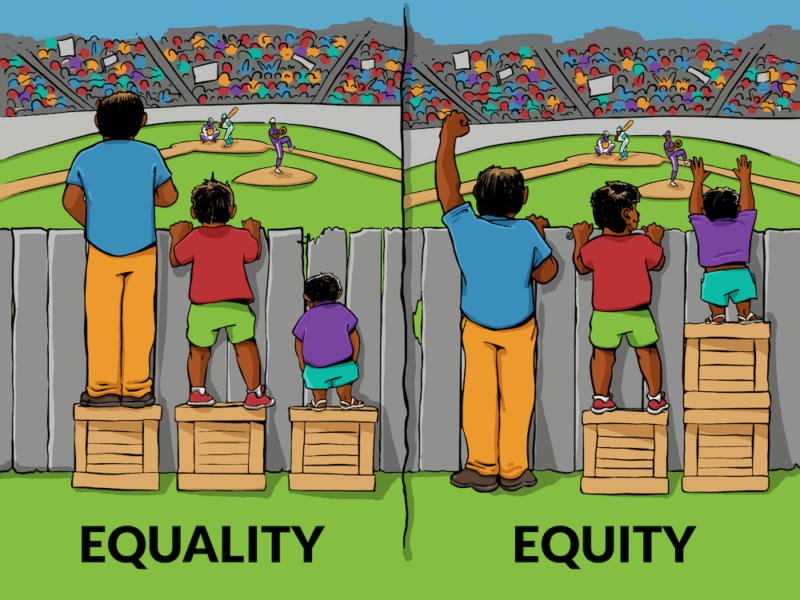Madison, Wisconsin Engages with Underserved Communities
This spotlight was featured in our ELECTricity newsletter in January 2021. Sign up to receive more success stories from election offices across the country. What is your office doing to prioritize equity? Tell us about it by emailing [email protected] — we’d love to share your story!
As election officials, you devote so much time, energy, passion, and creativity to serving your voters. While carrying out your ambitious voter outreach programs and strategies, you probably have noticed that sometimes underserved communities can still slip through the cracks. Language barriers, distrust of the voting system, or other obstacles often make it difficult for election officials to determine the needs of certain communities. But with the right strategy, you can tailor your efforts to ensure that your election office adequately serves all of your constituents.
Aiming to engage with underserved communities in a meaningful way, election offices across the country have made equity a guiding principle for their work. They have begun adopting programs that break down barriers to civic participation, and that encourage all people, regardless of historic racial or economic exclusion, to participate in the electoral process. The Madison City Clerk’s Office is one shining example. Seven years ago, City Clerk Maribeth Witzel-Behl and her team made an explicit commitment to center their work on equity, and have since made great strides.
Madison’s Racial Equity Journey
Maribeth and her team members first began to explore issues of equity while attending the YWCA Madison Racial Justice Summit in 2013, where they received a baseline report on the racial disparities in Dane County. The report found that the county’s disparities between white and Black community members–including unemployment rates, poverty rates, arrest rates, and educational achievement levels–were generally more extreme than those found in most other jurisdictions across the state and nation. The report states that “there is not a single indicator…in which African American well-being is on par with that of whites” and urged Madison’s leaders to respond more effectively and inclusively to issues of racial justice. The Madison City Clerk’s Office realized that equity needed to be prioritized in their own work, and the team quickly collaborated to develop their 2014-2015 office work plan using an equity lens.

In 2014, the City of Madison implemented its Racial Equity & Social Justice Initiative (RESJI), which seeks to address Madison’s most persistent inequities and to put issues of racial justice at the center of the city’s decisions, policies, and programs. Inspired by the initiative, the Clerk’s Office designated Tuesdays as “Equity Tuesdays,” during which the team sits down to have discussions about social and racial justice. Many of these conversations have led the office to take practical action steps, such as using an equitable hiring tool whenever they have a vacant position. Maribeth’s team is also committed to conducting three to four equity analyses per year in order to make more informed, equity-centered decisions. The process involves following a set of guided questions put forth by RESJI and holding discussions to examine the ways that communities of color and low-income populations will be affected by any actions proposed by the office.
Meeting Voters Where They Are
In order to begin working toward equity, Maribeth knew that she must first understand the needs of those who have traditionally been excluded from the electoral system. Identifying the needs of historically disenfranchised communities may seem challenging, but Maribeth has some expert advice: meet voters where they are, and really listen. “Talk to potential voters one-on-one at the food pantry to hear first-hand about the obstacles they face when trying to vote,” she suggests. That’s precisely what she did. During those food pantry visits, Maribeth met with individuals who had finished serving felony sentences, many of whom erroneously assumed they could never vote again. Some of them had even been eligible to vote for decades. In response, she partnered up with a community group that helps men prepare to be released from jail. She regularly visits their group sessions and informs them that their voting rights will be restored as soon as they finish serving a felony sentence. Thanks to Maribeth’s efforts to meet and engage with those individuals, dozens of eligible voters who would have remained shut out of the electoral process can now call themselves proud voters.
According to Maribeth, participating in community organizations’ events is a useful way to meet with eligible voters and better understand their needs. For instance, the Madison City Clerk’s Office regularly offers voter registration drives at the Urban League’s candidate forums and city barbeques. They also participate in the “Back to School Celebration” held by their partner, 100 Black Men of Madison. At this annual event, 100 Black Men of Madison distribute free backpacks full of school supplies to elementary students, and they host a mock election to help the children envision themselves as future voters. Using an accessible ballot marking device, the students vote for their favorite pizza toppings, superheroes, and preferred parts of the school day, and feed their ballot cards into a tabulator to be counted. As the children participate, members of the Madison City Clerk’s Office make themselves available to answer any questions about the voting process that community members may have. Maribeth explained, “Several parents have said, ‘Is this the equipment I would use if I went to the polls? It’s easier than I thought!’”

Asking for and Receiving Feedback
Developing and strengthening partnerships with such community organizations is an essential way that the Clerk’s Office receives valuable feedback from historically underserved communities. “We need to make space for those who are most likely to be disenfranchised to provide feedback,” says Maribeth. “Trust needs to be earned, and we need to be cognizant of the history behind mistrust of the voting system.” In order to earn that trust, the Clerk’s Office invites community organizations to participate in every equity analysis that it conducts. “At each meeting, we stressed that the Clerk’s Office was there to listen and learn, and we did just that.” Maribeth added, “We were not there to defend ourselves or our actions, although that can be tempting.” At these meetings, Maribeth noticed that it often took participants a while to open up and share their feedback. In response, she decided to hold multiple meetings for each equity analysis, and that seemed to help increase participants’ level of comfort.
Feedback from community organizations has proven to be invaluable, not only in times of normalcy, but also in times of crisis. During the COVID-19 pandemic, such feedback allowed the office to make informed decisions about what community members truly needed. As the Madison City Clerk’s Office processed tens of thousands of absentee requests in March of 2020, they noticed that very few of the voter ID images accompanying the requests were from people of color. Rather than assuming that mailing every voter an absentee request for the fall elections would be the right move, they insisted on completing an equity analysis before developing a plan for the fall. Despite working 100 hour weeks to ensure that their constituents could vote safely during a pandemic, they made equity work a priority, and their hard work paid off. The Pandemic Voting Access Equity Analysis demonstrated that absentee voting by mail is in fact not a good option for everyone, and the office learned that it would be imperative for voters, particularly people of color, to have options for voting in person at an easily accessible location close to home. Armed with that powerful information about voters’ actual needs, the Clerk’s Office encouraged voters to make their own safe voting plan – whether voting absentee by mail, voting absentee in person, or voting at the polls on Election Day.

Equity Work as an Ongoing Process
Developing programs and making decisions that focus on equity is not something that can easily be checked off a to-do list; it is an ongoing process that requires a continuous commitment. The Madison City Clerk’s Office has accomplished a great deal in terms of equity, but they understand that this important work will never be over. That’s why they created a monthly newsletter for their poll workers, which apart from providing updates about election procedures, also includes articles about equity, anti-racism, and inclusion. Plus, they regularly ask their election workers of color for feedback on their experiences with working at the polls. The office is sure to adjust their poll worker training sessions to address any of their concerns, ideas, or suggestions.
As part of the office’s ongoing equity efforts, Maribeth is looking forward to conducting a Hmong Voting Access Equity Analysis this year. The Clerk’s Office additionally has plans to work with the Ho-Chunk Nation on a sticker to distribute at an Indigenous Peoples Day voter registration drive. The office is excited to continually learn and evolve to better meet the needs of their historically underserved constituents.

Implementing Equitable Programs and Practices in Your Election Office
If you’re thinking about how you can begin using an equity lens in your own election office, you’re probably wondering where to start. But you might have already begun conducting equity work without even realizing it. That was the case with the Madison City Clerk’s Office. For instance, long before they made an explicit commitment to equity, they were recruiting election officials to reflect the city’s demographics, simply because they thought it was the right thing to do. Reflecting on any equitable programs or practices you may already have in place is a good place to start.
Next, Maribeth says that education is critical. “Develop a sense of urgency by educating your entire team about systemic racism,” she suggests. She recommends watching the documentary series, Race: The Power of an Illusion. Everyone in her office has taken Patti Digh’s course, Hard Conversations: Deep Dive Into Racism and Its Undoing, and by the end of this year, the entire office will have completed an African American history course. These online courses are an excellent way to engage election administrators and allow them to learn at their own pace. Maribeth also recommends being intentional about diversifying the authors that you read. And of course, be willing to go out into the community to talk to potential voters in order to understand their needs and concerns.
We recognize that many election officials may not have the time or resources to connect with underserved communities on a regular basis, and others might have to push themselves out of their comfort zones to do such work. That’s why we encourage you to use your team as effectively as possible. Is there a particularly outgoing election worker who would be eager to visit community events to speak with potential voters? Could you assemble a volunteer team to assist in these efforts? However you decide to structure your team, remember that practice and patience are key. The longer you engage with the community and the more relationships you form, the easier it will be.
What is your office doing to prioritize equity? Have you seen other offices carry out equitable programs? Let us know by emailing [email protected]. We would love to hear from you!